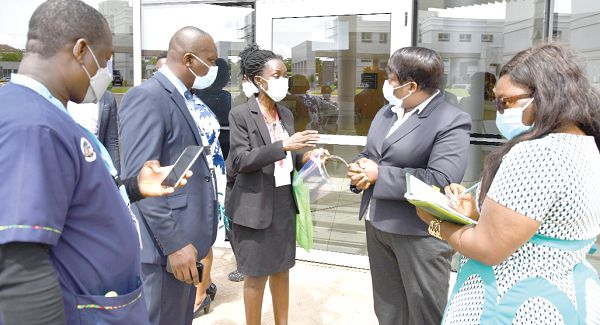
‘Dangerous COVID-19 not death warrant’
The novel coronavirus (COVID-19) infection is very dangerous but it is not, at all cost, a death warrant.
Early detection, treatment and management of the situation can help people who are infected to recover.
The Head of the medical team handling COVID-19 cases at the University of Ghana Medical Centre, Dr Godfred Takyi, has disclosed.
In an interview with the Daily Graphic last Tuesday, he said with the exception of people with underlying health conditions, those who sought help early could fully recover and get back on their feet.
“COVID-19 is a dangerous disease just like malaria and cholera. It is the mode of spread and infection that makes it very dangerous, but it is not a death warrant.
“Anyone who gets infected does not sign the death warrant. Once you seek help early, you can be treated and cured,” he said.
Dr Takyi has thus encouraged the public to take the advice of reporting early to hospital if they have symptoms of the disease seriously.
Novel virus
He said much was not known about the virus and that was contributing to the many lives it was claiming, including those of healthcare professionals in the line of duty.
“There are four stages of infection – the asymptomatic, mild, severe and critical. Asymptomatic persons take a while to show any symptoms unlike those with mild conditions who show symptoms. The severe and critical require an enhanced level of medical treatment including being kept in intensive care at the hospital. Often, those who have lost the battle are those with other chronic ailments such as hypertension, diabetes or other conditions.”
“However, for the ordinary person without any conditions and who follows the safety protocols strictly both in private and at work, the mystery surrounding the disease can be unmasked at the primary stage,” he assured.
Absolute safety
Dr Takyi has thus impressed on the public to adhere to the safety directives on the disease to help prevent its spread.
He said at the University of Ghana Medical Centre, extreme care was taken and adequate measures put in place to ensure that all who went in and out of the facility were safe.
To make certain that health staff and all those involved in handling cases of COVID-19 did not get infected in the line of duty, he said, extreme care was taken in providing safety at all times as they went in and out of the treatment area.
A Principal Nursing Officer and Supervisor at the COVID-19 treatment centre at the UGMC, Mrs Rita Odonkor, said it was a rule for health staff to take a bath at the facility once their shift was over to ensure the virus was not sent home.
“As a personal safety precaution, I leave nothing to chance so when I get home, I head straight to the bathroom to wash down before interacting with my family,” she said.
Worried patients
Recounting her experience, a nurse at the COVID-19 treatment centre at the Greater Accra Regional Hospital said a patient came in at one time looking very worried that she was going to die because she was infected and cried throughout the night.
“We spoke to her and explained things to her and encouraged her. She is among the many people who have recovered and has promised to be an ambassador to educate people. Her worry, though, is that she would be tagged and stigmatised,” she said.
Support
A Medical Officer and a member of the Accra Regional Hospital’s COVID-19 response team, Dr Mrs Barbara Asare Afriyie, said her husband was worried about her and opted to get her personal protective equipment (PPE) to keep her safe.
“However, I assured him that we have been provided with PPE at the hospital and that allayed his fears. I think frontline health workers need support and encouragement from their family members, especially, and not shunned just because they are involved in managing COVID-19 cases at their workplaces,” Dr Asare Afriyie said.
“As health workers, we are working for God and country and so need the support of everyone as we provide care for the sick, including patients infected with COVID-19,” she said.
